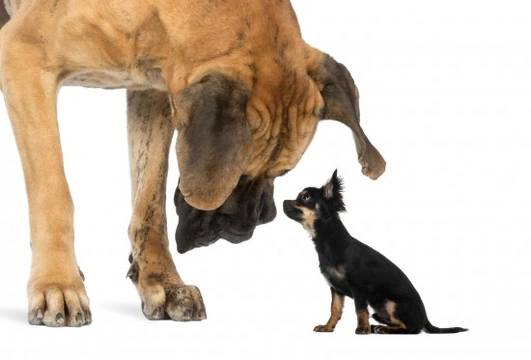
Big Dogs, Why They Don't Live as Long As Their Smaller Counterparts
In general, larger animals tend to have longer lifespans than smaller creatures. The rule of thumb is the larger you are in the animal world, the longer you are going to live for. A blue whale or Galapagos tortoise can live well into their nineties if not longer in the case of the tortoise, yet a smaller mammal, namely a bumblebee bat will only live between five to ten years. So why is it that smaller dogs tend to have longer lifespans than bigger breeds?
Studies have shown that larger animals are slower therefore they are more efficient when it comes to how they use their energy. Because they are slow, they wear their body parts out a lot slower too and this means they last longer. However, when it comes to dogs, all of this goes out of the window, and the same can be said for mice, horses and even humans.
Dog lovers all over the world have come to terms with the fact their big pet dog will not live as long as their neighbours smaller pooch. Small breeds of dog can live for anything from 12 to 14 years yet a larger breed it's only 8 to 10 years. Giant breeds of dog have even shorter lifespans, only living anywhere from 5 to 8 years.
Although scientists think they understand why the majority of larger species of the world live longer than smaller animals, nobody is one hundred percent sure why the opposite is true when it comes to our canine friends, the dog. One school of thought puts the blame on how larger breeds of dog have been bred paired to the speed at which they grow.
Accelerated Growth To Blame
When it comes to growth rate, larger dogs tend to grow extremely fast – an example being a year old Great Dane which although only 12 months old happens to be massive. This particular breed grows at an amazing rate, increasing their weight 100-fold in the first year of their lives.
In the wild, wolves only develop 60-fold and little pet poodles only do so 20-fold in the same time frame. Recent research has shown this accelerated growth in larger dogs, contributes to their shorter lives because with the faster growth rate comes an increased free-radical activity – the result being larger dogs are prone to suffer from more diseases and illnesses than smaller dogs are.
Big Dogs Age Faster
Another study which was recently published suggests that big breeds of dog age a lot faster than smaller ones. However, the fact big dogs age faster is not the only reason for their shorter lifespans because larger dogs also suffer from more health issues than their smaller counterparts. These health problems include things like gastrointestinal and musculoskeletal diseases. Big dogs are prone to suffering from tumours and all of these diseases are associated with accelerated growth rates.
What About Selective Breeding?
Selective breeding is thought to be to blame for the fact larger breeds have shorter lifespans. Scientists believe this is one of the causes for the faster rates of growth which means big dogs suffer from these rather nasty side effects. Most animals take a millenia to evolve and as such it is a natural process and not a man made one that makes them what they are.
What You Can Do To Help a Larger Breed of Dog
If you own a big dog, as they do get older and start to reach their senior years, you need to keep an eye on their weight. This is especially true as it's now believed that because larger breeds develop too fast, it puts more pressure on their joints. If your dog is overweight, it makes the situation worse because carrying too much weight just amplifies the problem.
As your dog gets older, it's also important if not crucial, for them to have regular health checks at the vets. Catching a health issue early means being able to treat the condition before it escalates into something that's much harder to get on top of.
Checking Your Pet's Teeth
You also need to keep an eye on your four legged friends' teeth. Dental health in older dogs can be the cause of many serious and painful conditions. Regular visits to the vet to check on tartar build-up is essential to your pet's health all through their lives, but more especially as they get older.
Conclusion
Over the years there have been many studies into why smaller dogs tend to live a lot longer than larger breeds. The conclusive evidence of many of these studies, is that bigger dogs tend to grow and develop too fast. It is thought that selective breeding has contributed to the fact bigger breeds have shorter lifespans but smaller dogs too have been specifically bred for certain of their features.
The fact remains, that larger breeds of dog suffer from illnesses and diseases which don't affect their smaller counterparts quite so badly. If you do own an older, large breed of dog, the best thing to do is keep a close eye on their health and to take them for regular health checks at the vets.



